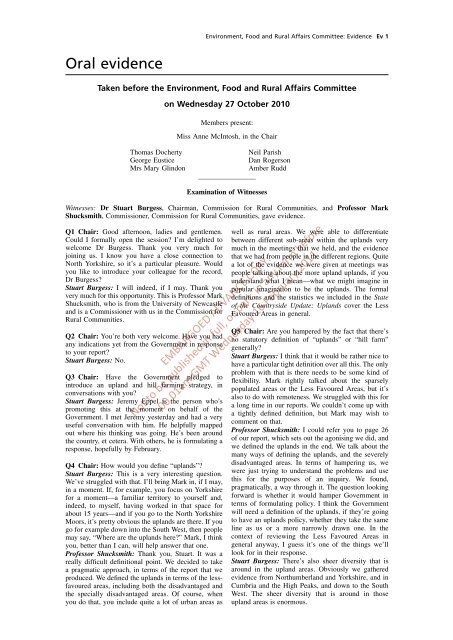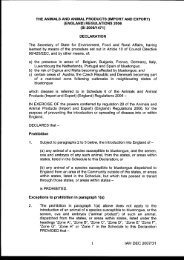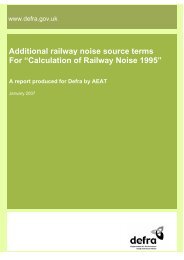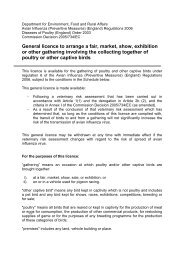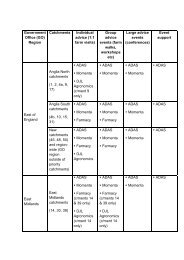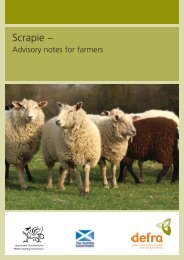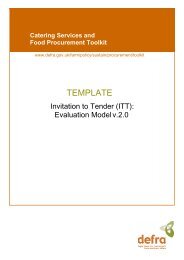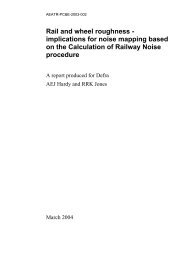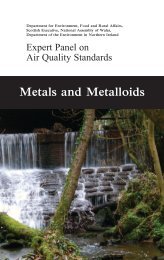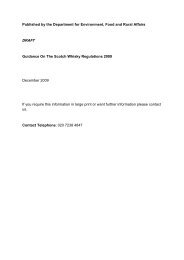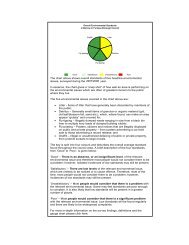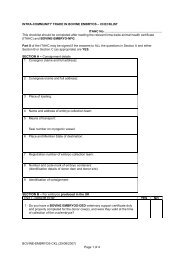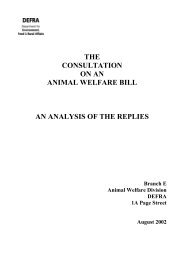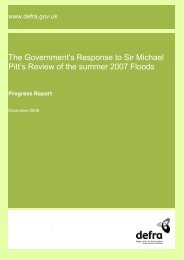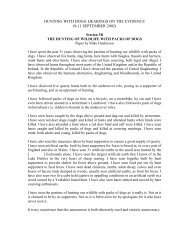Farming in the Uplands - ARCHIVE: Defra
Farming in the Uplands - ARCHIVE: Defra
Farming in the Uplands - ARCHIVE: Defra
You also want an ePaper? Increase the reach of your titles
YUMPU automatically turns print PDFs into web optimized ePapers that Google loves.
Oral evidence<br />
Environment, Food and Rural Affairs Committee: Evidence Ev 1<br />
Taken before <strong>the</strong> Environment, Food and Rural Affairs Committee<br />
Thomas Docherty<br />
George Eustice<br />
Mrs Mary Gl<strong>in</strong>don<br />
on Wednesday 27 October 2010<br />
Members present:<br />
Miss Anne McIntosh, <strong>in</strong> <strong>the</strong> Chair<br />
Neil Parish<br />
Dan Rogerson<br />
Amber Rudd<br />
________________<br />
Exam<strong>in</strong>ation of Witnesses<br />
Witnesses: Dr Stuart Burgess, Chairman, Commission for Rural Communities, and Professor Mark<br />
Shucksmith, Commissioner, Commission for Rural Communities, gave evidence.<br />
Q1 Chair: Good afternoon, ladies and gentlemen.<br />
Could I formally open <strong>the</strong> session? I’m delighted to<br />
welcome Dr Burgess. Thank you very much for<br />
jo<strong>in</strong><strong>in</strong>g us. I know you have a close connection to<br />
North Yorkshire, so it’s a particular pleasure. Would<br />
you like to <strong>in</strong>troduce your colleague for <strong>the</strong> record,<br />
Dr Burgess?<br />
Stuart Burgess: I will <strong>in</strong>deed, if I may. Thank you<br />
very much for this opportunity. This is Professor Mark<br />
Shucksmith, who is from <strong>the</strong> University of Newcastle<br />
and is a Commissioner with us <strong>in</strong> <strong>the</strong> Commission for<br />
Rural Communities.<br />
Q2 Chair: You’re both very welcome. Have you had<br />
any <strong>in</strong>dications yet from <strong>the</strong> Government <strong>in</strong> response<br />
to your report?<br />
Stuart Burgess: No.<br />
Q3 Chair: Have <strong>the</strong> Government pledged to<br />
<strong>in</strong>troduce an upland and hill farm<strong>in</strong>g strategy, <strong>in</strong><br />
conversations with you?<br />
Stuart Burgess: Jeremy Eppel is <strong>the</strong> person who’s<br />
promot<strong>in</strong>g this at <strong>the</strong> moment on behalf of <strong>the</strong><br />
Government. I met Jeremy yesterday and had a very<br />
useful conversation with him. He helpfully mapped<br />
out where his th<strong>in</strong>k<strong>in</strong>g was go<strong>in</strong>g. He’s been around<br />
<strong>the</strong> country, et cetera. With o<strong>the</strong>rs, he is formulat<strong>in</strong>g a<br />
response, hopefully by February.<br />
Q4 Chair: How would you def<strong>in</strong>e “uplands”?<br />
Stuart Burgess: This is a very <strong>in</strong>terest<strong>in</strong>g question.<br />
We’ve struggled with that. I’ll br<strong>in</strong>g Mark <strong>in</strong>, if I may,<br />
<strong>in</strong> a moment. If, for example, you focus on Yorkshire<br />
for a moment—a familiar territory to yourself and,<br />
<strong>in</strong>deed, to myself, hav<strong>in</strong>g worked <strong>in</strong> that space for<br />
about 15 years—and if you go to <strong>the</strong> North Yorkshire<br />
Moors, it’s pretty obvious <strong>the</strong> uplands are <strong>the</strong>re. If you<br />
go for example down <strong>in</strong>to <strong>the</strong> South West, <strong>the</strong>n people<br />
may say, “Where are <strong>the</strong> uplands here?” Mark, I th<strong>in</strong>k<br />
you, better than I can, will help answer that one.<br />
Professor Shucksmith: Thank you, Stuart. It was a<br />
really difficult def<strong>in</strong>itional po<strong>in</strong>t. We decided to take<br />
a pragmatic approach, <strong>in</strong> terms of <strong>the</strong> report that we<br />
produced. We def<strong>in</strong>ed <strong>the</strong> uplands <strong>in</strong> terms of <strong>the</strong> lessfavoured<br />
areas, <strong>in</strong>clud<strong>in</strong>g both <strong>the</strong> disadvantaged and<br />
<strong>the</strong> specially disadvantaged areas. Of course, when<br />
you do that, you <strong>in</strong>clude quite a lot of urban areas as<br />
well as rural areas. We were able to differentiate<br />
between different sub-areas with<strong>in</strong> <strong>the</strong> uplands very<br />
much <strong>in</strong> <strong>the</strong> meet<strong>in</strong>gs that we held, and <strong>the</strong> evidence<br />
that we had from people <strong>in</strong> <strong>the</strong> different regions. Quite<br />
a lot of <strong>the</strong> evidence we were given at meet<strong>in</strong>gs was<br />
people talk<strong>in</strong>g about <strong>the</strong> more upland uplands, if you<br />
understand what I mean—what we might imag<strong>in</strong>e <strong>in</strong><br />
popular imag<strong>in</strong>ation to be <strong>the</strong> uplands. The formal<br />
def<strong>in</strong>itions and <strong>the</strong> statistics we <strong>in</strong>cluded <strong>in</strong> <strong>the</strong> State<br />
of <strong>the</strong> Countryside Update: <strong>Uplands</strong> cover <strong>the</strong> Less<br />
Favoured Areas <strong>in</strong> general.<br />
Q5 Chair: Are you hampered by <strong>the</strong> fact that <strong>the</strong>re’s<br />
no statutory def<strong>in</strong>ition of “uplands” or “hill farm”<br />
generally?<br />
Stuart Burgess: I th<strong>in</strong>k that it would be ra<strong>the</strong>r nice to<br />
have a particular tight def<strong>in</strong>ition over all this. The only<br />
problem with that is <strong>the</strong>re needs to be some k<strong>in</strong>d of<br />
flexibility. Mark rightly talked about <strong>the</strong> sparsely<br />
populated areas or <strong>the</strong> Less Favoured Areas, but it’s<br />
also to do with remoteness. We struggled with this for<br />
a long time <strong>in</strong> our reports. We couldn’t come up with<br />
a tightly def<strong>in</strong>ed def<strong>in</strong>ition, but Mark may wish to<br />
comment on that.<br />
Professor Shucksmith: I could refer you to page 26<br />
of our report, which sets out <strong>the</strong> agonis<strong>in</strong>g we did, and<br />
we def<strong>in</strong>ed <strong>the</strong> uplands <strong>in</strong> <strong>the</strong> end. We talk about <strong>the</strong><br />
many ways of def<strong>in</strong><strong>in</strong>g <strong>the</strong> uplands, and <strong>the</strong> severely<br />
disadvantaged areas. In terms of hamper<strong>in</strong>g us, we<br />
were just try<strong>in</strong>g to understand <strong>the</strong> problems and use<br />
this for <strong>the</strong> purposes of an <strong>in</strong>quiry. We found,<br />
pragmatically, a way through it. The question look<strong>in</strong>g<br />
forward is whe<strong>the</strong>r it would hamper Government <strong>in</strong><br />
terms of formulat<strong>in</strong>g policy. I th<strong>in</strong>k <strong>the</strong> Government<br />
will need a def<strong>in</strong>ition of <strong>the</strong> uplands, if <strong>the</strong>y’re go<strong>in</strong>g<br />
to have an uplands policy, whe<strong>the</strong>r <strong>the</strong>y take <strong>the</strong> same<br />
l<strong>in</strong>e as us or a more narrowly drawn one. In <strong>the</strong><br />
context of review<strong>in</strong>g <strong>the</strong> Less Favoured Areas <strong>in</strong><br />
general anyway, I guess it’s one of <strong>the</strong> th<strong>in</strong>gs we’ll<br />
look for <strong>in</strong> <strong>the</strong>ir response.<br />
Stuart Burgess: There’s also sheer diversity that is<br />
around <strong>in</strong> <strong>the</strong> upland areas. Obviously we ga<strong>the</strong>red<br />
evidence from Northumberland and Yorkshire, and <strong>in</strong><br />
Cumbria and <strong>the</strong> High Peaks, and down to <strong>the</strong> South<br />
West. The sheer diversity that is around <strong>in</strong> those<br />
upland areas is enormous.<br />
EMBARGOED ADVANCE COPY:<br />
Not to be published <strong>in</strong> full, or part, <strong>in</strong> any form before<br />
00.01am GMT Wednesday 16 February 2011


